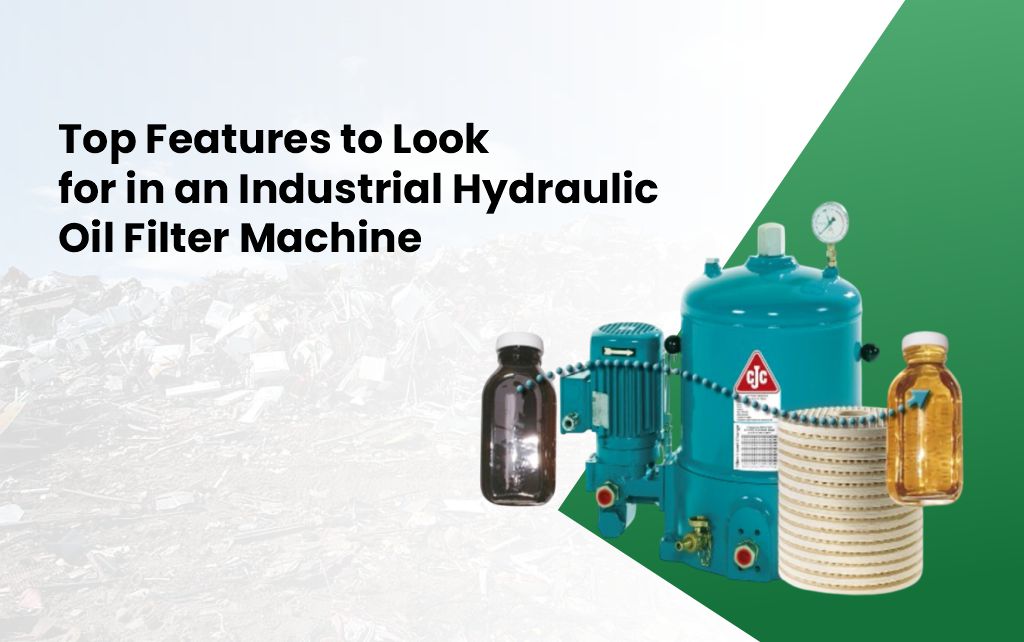Top Features to Look for in an Industrial Hydraulic Oil Filter Machine

Strong 8k brings an ultra-HD IPTV experience to your living room and your pocket.
In India’s rapidly growing industrial landscape, hydraulic systems power critical machinery in sectors like manufacturing, construction, mining, and power generation. Maintaining clean hydraulic oil is essential to ensure the longevity and efficiency of these systems, as contaminants like dirt, water, and metal particles can cause significant damage. An industrial hydraulic oil filter machine is a vital tool for achieving this, offering advanced filtration to keep hydraulic systems running smoothly. With a variety of machines available in the Indian market, selecting the right one requires careful consideration of key features. This blog outlines the top features to look for in an industrial hydraulic oil filter machine, tailored to the needs of Indian industries, to help businesses make informed decisions.
High-Efficiency Filtration Technology
A top priority when choosing an industrial hydraulic oil filter machine is its ability to achieve high cleanliness levels, often measured by standards like NAS 1638 or ISO 4406. Look for machines capable of filtering contaminants down to 1 micron or less, as fine particles can cause significant wear in hydraulic systems. Advanced filtration media, such as glass fibre or synthetic materials, ensure effective removal of dirt, metal shavings, and sludge, enhancing system performance.
The best hydraulic oil filter machines employ multi-stage filtration to tackle various contaminants. These systems typically include primary filters for larger particles, secondary filters for finer debris, and even water-removal stages. Multi-stage filtration ensures comprehensive cleaning, making the machine suitable for diverse applications in India, from plastic injection moulding to heavy-duty mining equipment.
Water and Moisture Removal Capabilities
Water contamination is a common issue in hydraulic systems, especially in humid regions of India. A high-quality industrial hydraulic oil filter machine should feature advanced dehydration technology, such as vacuum treatment or centrifugal separation, to remove water down to levels below 500 PPM. This prevents corrosion, acid formation, and premature wear of components like pumps and valves.
Modern machines often include sensors to monitor moisture levels in real time, providing alerts when water content exceeds safe thresholds. This feature is particularly valuable in Indian industries like cement and steel, where machinery operates in challenging environments. Machines with digital displays for moisture, flow rate, and contamination levels allow operators to ensure optimal performance.
High Flow Rates and Customizable Capacity
Indian industries vary widely, from small-scale workshops to large manufacturing plants. A good hydraulic oil filter machine should offer customizable flow rates, ranging from compact 140 LPH units for smaller systems to high-capacity 20,000 LPH machines for heavy-duty applications. This flexibility ensures the machine meets specific operational needs, whether for hydraulic presses or power plant turbines.
For industries like oil and gas or construction, where pipelines accumulate debris during commissioning or repairs, high-velocity flushing is a critical feature. Machines with powerful pumps and high flow rates can dislodge contaminants like welding slag and pipe scale, ensuring a clean system before startup. This feature reduces downtime and extends equipment life, a key consideration for Indian businesses aiming to maximise efficiency.
Portability and Ease of Use
1. Mobile Units for On-Site Filtration
In India, where industrial operations often span multiple locations, portable hydraulic oil filter machines are highly practical. Mobile trolleys or cart-based systems allow for on-site filtration, making them ideal for rotational cleaning of factory machinery or emergency maintenance. Look for compact designs with wheels and ergonomic handles for easy manoeuvrability.
2. User-Friendly Controls and Automation
Ease of operation is crucial for efficient use in busy industrial settings. Machines with automated controls, such as PLC systems or human-machine interfaces, simplify operation and reduce the need for skilled labour. Digital displays showing real-time parameters like pressure and filtration status enhance usability, ensuring operators in India can maintain systems with minimal training.
Durability and Low Maintenance
Indian industries, particularly in mining, construction, and steel, operate in dusty and high-temperature conditions. A durable hydraulic oil filter machine, constructed from materials like mild steel or stainless steel, can withstand these environments. Look for machines with corrosion-resistant components and a design that minimises wear, ensuring long-term reliability.
Machines with minimal recurring costs, such as those with reusable or cleanable filter cartridges, are ideal for cost-conscious Indian businesses. Systems like those from Liasotech, which use long-lasting coniferous wood pulp cartridges, reduce maintenance time and expenses. Features like self-contained recycling systems further lower operational costs by eliminating the need for frequent oil changes.
Advanced Contaminant Removal Features
Ferrous particles, common in hydraulic systems due to wear in components like pumps, can cause significant damage. Machines equipped with magnetic filters effectively capture metal shavings, preventing them from circulating back into the system. This feature is particularly useful in Indian industries like automotive manufacturing, where precision is critical.
For ultra-fine contaminant removal, some advanced machines use electrostatic filtration, which charges particles to attract them to dielectric media. This technology is effective for removing sub-micron particles and is ideal for high-precision applications like aerospace or injection moulding in India. Machines with this feature ensure superior oil cleanliness, reducing wear and improving product quality.
Compatibility with Indian Industrial Needs
1. Support for Multiple Oil Types
A versatile hydraulic oil filter machine should handle various oils, including hydraulic, gear, synthetic, and water-glycol fluids. This compatibility is essential for Indian industries with diverse machinery, such as cement plants or plastic extrusion units. Machines that can clean multiple oil types without requiring extensive reconfiguration save time and resources.
2. Adherence to Industry Standards
In India, compliance with standards like NAS 1638 and ISO 4406 is critical for ensuring oil cleanliness in sensitive applications like power generation or aviation. Look for machines that guarantee these cleanliness levels, as demonstrated by suppliers like Liasotech, which have achieved NAS Class 0–3 in real-world applications. This ensures reliability and regulatory compliance.
Energy Efficiency and Environmental Benefits
1. Low Power Consumption
Energy costs are a significant concern for Indian industries. Hydraulic oil filter machines with low power consumption, such as those with 0.36kW or 0.67kW motors, offer cost savings while maintaining high performance. Energy-efficient designs reduce operational expenses, making them attractive for businesses in cost-sensitive markets like India.
2. Reduced Oil Waste and Environmental Impact
By extending oil life and reducing the need for frequent replacements, advanced filtration machines contribute to sustainability. Features like dehydration and contamination removal minimise oil disposal, aligning with India’s growing focus on environmental responsibility. Machines that reduce oil consumption by up to 40%, as seen in some cement plants, also lower disposal costs.
After-Sales Support and Availability in India
Choosing a machine from a supplier with a strong presence in India, such as Minimac Systems or Matrix Filtration, ensures easy access to spare parts and technical support. Local manufacturing, as offered by companies in Pune or Ahmedabad, reduces lead times and costs for Indian businesses.
A reliable supplier should offer a warranty (typically 1–2 years) and operator training to ensure effective use. Companies like Liasotech provide after-sales support and customised solutions, which are critical for Indian industries dealing with unique filtration challenges. This support minimises downtime and enhances the machine’s value.
Conclusion
Selecting the right hydraulic oil filter machine supplier is critical for Indian industries aiming to enhance machinery performance, reduce downtime, and lower maintenance costs. Key features like high-efficiency filtration, water removal, customizable capacity, portability, and durability make these machines indispensable in sectors like manufacturing, mining, and power generation. Advanced technologies, such as magnetic and electrostatic filtration, ensure superior oil cleanliness, while energy-efficient designs and environmental benefits align with India’s sustainability goals.
By choosing a machine from reputable suppliers with strong local support, businesses can optimise their hydraulic systems and achieve long-term cost savings. Investing in a high-quality filtration machine tailored to India’s industrial needs is a strategic step towards operational excellence and equipment longevity.
Note: IndiBlogHub features both user-submitted and editorial content. We do not verify third-party contributions. Read our Disclaimer and Privacy Policyfor details.


